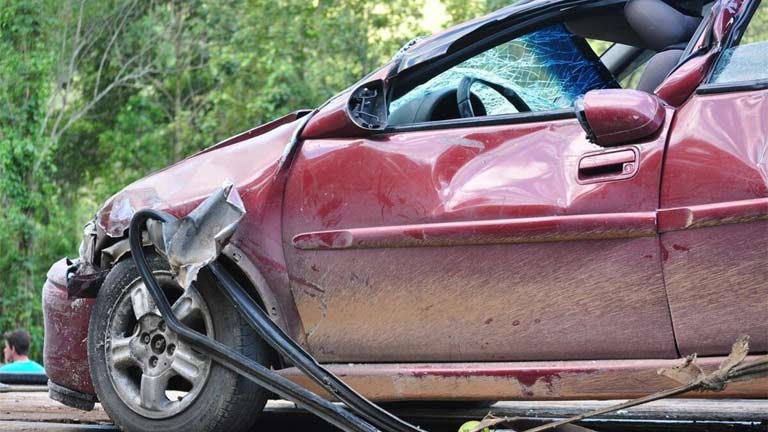
We don’t want that you face an accident and get injured. But unfortunately, if you fall in this situation then what should you do? The following is a guide on what to do after an accident.
Stay Calm and Ensure Safety: The First Steps After an Accident
While it’s natural to feel shaken and overwhelmed in such situations, maintaining composure is essential for your well-being and the well-being of others. Here, we will discuss in detail the importance of staying calm and ensuring safety after an accident.
1. Prioritize Personal Safety
The first priority after an accident is to prioritize your own safety and the safety of others. Assess your condition and check for any immediate injuries. If you’re able to move, carefully exit your vehicle and move to a safe location away from traffic. If you are unable to move or fear a major injury, it is critical that you remain in your car until medical personnel arrive. Turning on your hazard lights and placing warning signs can assist other vehicles in becoming aware of the collision.
2. Call for Emergency Assistance
If there are any injuries or if the accident involves significant damage, it’s crucial to call emergency services immediately. Dial the appropriate emergency number to report the accident and provide accurate information about the location and the nature of the injuries. Emergency services will dispatch the necessary personnel, such as paramedics and police officers, to assist you and provide medical aid if required.
3. Assess the Surroundings
While ensuring your safety, assess the surroundings and be mindful of any potential hazards. If it is safe to do so, try to preserve the accident scene as much as possible until the authorities arrive. This includes leaving the vehicles in their current positions and avoiding the removal of any debris unless it poses an immediate threat.
4. Communicate with the Other Party
Following the immediate safety concerns, it is critical to speak with the other party involved in the collision. Approach the situation calmly and exchange necessary information, such as names, contact details, and insurance information. Avoid engaging in heated arguments or admitting fault, as it is the responsibility of insurance companies and authorities to determine liability based on evidence and statements.
5. Seek Medical Attention
Even if you don’t experience immediate pain or visible injuries, it’s advisable to seek medical attention after an accident. Some injuries may not manifest immediately, and a medical evaluation can identify any hidden or delayed injuries. Furthermore, medical paperwork will be useful when making an insurance claim and requesting compensation for medical expenditures.
6. Insurance
When it comes to car insurance, being prepared and knowing the necessary steps to take after an accident can make a world of difference. After an accident, it’s crucial to take immediate action and ensure your well-being and the well-being of others involved. Once safety has been established, it’s time to check car insurance coverage. Assess your policy details, including coverage limits and deductibles, to determine the extent of protection you have in place.
If you’re considering options for car insurance class 1, which offers comprehensive coverage for private cars, now is the time to explore those choices. By being proactive and knowledgeable about your car insurance, you can make informed decisions that will protect you financially and provide you with the confidence to handle any accident-related situations that may arise. So, make sure to renew your car insurance.
In the event of an accident, your car insurance acts as a financial safety net, protecting you from substantial costs and providing the peace of mind you need during such challenging times. By understanding the necessary steps to take after an accident, you can navigate the process smoothly, secure in the knowledge that your car insurance is there to support you.
Gather Information: Building a Comprehensive Accident Report
After an accident, gathering accurate and detailed information is crucial for insurance purposes and potential legal proceedings. By collecting essential information about the accident, you can ensure a smoother claims process and help establish a clear understanding of the events that transpired.
1. Exchange Contact and Insurance Information
One of the first steps in gathering information after an accident is exchanging contact and insurance information with other parties involved. Obtain the drivers’ names, phone numbers, and addresses, as well as the names and policy numbers of their insurance companies. This information is critical for communicating with the insurance providers and commencing the claims procedure.
2. Document Accident Details
Take the time to document crucial accident details. Record the date, time, and location of the accident, as well as the weather and road conditions at the time of the incident. Use your smartphone or a camera to take photos of the actual accident scene from different angles, capturing any damage to the vehicles involved. These visual records can serve as valuable evidence when filing an insurance claim.
3. Identify Witnesses
If there were witnesses to the accident, gather their contact information, including names and phone numbers. Witnesses can provide unbiased accounts of the events and help support your version of the accident if needed. Their statements may be crucial in determining liability or providing additional context to the insurance company.
4. File a Police Report
In some cases, it may be necessary to file a police report, more importantly, if the accident resulted in significant property damage, injuries, or potential disputes. Contact the local authorities and provide them with accurate information about the accident. The police report will outline the details of the accident and may include statements from involved parties and witnesses. Request a copy of the report for your records and insurance purposes.
5. Keep a Personal Record
Maintain a personal record of the accident. Include any information that may be relevant, such as your account of the events leading up to the accident, any physical or emotional injuries you sustained, and the impact of the accident on your daily life. Document any medical treatments received, including dates, healthcare providers, and expenses incurred. This comprehensive record will assist you when discussing the accident with insurance adjusters or seeking legal counsel, if necessary.
6. Preserve Communication Records
Keep a record of all communications related to the accident. This includes emails, phone calls, and letters exchanged with insurance companies, witnesses, or other involved parties. Document the date, time, and content of each communication. These records will help track the progress of your claim and serve as evidence of the steps taken throughout the process.
Report the Accident to Your Insurance Company: Initiating the Claims Process
Reporting the accident initiates the claims process and allows your insurance provider to begin assessing the damages, coordinating repairs, and providing you with the necessary support.
1. Contact Your Insurance Provider
As soon as possible after the accident, contact your insurance provider to report the incident. Refer to your insurance policy or insurance card for the appropriate contact information. Be prepared to provide accurate and detailed information about the accident, as well as the parties involved. Inform the insurance representative of any injuries sustained and the extent of the damages to your vehicle.
2. Provide Accurate Information
When reporting an accident, it is crucial to provide accurate and truthful information to your insurance company. Be transparent about the circumstances surrounding the accident and avoid making any assumptions or exaggerations. Providing accurate information ensures a smooth and fair claims process. Remember, any misrepresentation of facts could potentially lead to claim denial or other complications down the line.
3. Follow Reporting Procedures
Your insurance company may have specific reporting procedures that you need to follow. Familiarize yourself with these procedures and adhere to them when reporting the accident. This may include completing claim forms, providing supporting documentation, or providing additional information as requested. Following the reporting procedures ensures that your claim is processed efficiently and minimizes any potential delays.
4. Provide Supporting Documentation
Gather and supply any essential supporting paperwork to back up your claim. This might include images of the accident site, car damage, or apparent injuries. If a police report was filed, request a copy and send it to your insurance provider. Maintain a record of any medical bills, repair receipts, or other pertinent papers that may be requested throughout the claims process.
5. Communicate Clearly and Cooperate
Maintain open and clear communication with your insurance company throughout the claims process. Respond promptly to any inquiries or requests for additional information. Cooperate with the insurance adjuster assigned to your claim, providing any necessary documentation or statements as requested. Clear and timely communication helps ensure a smooth and efficient resolution of your claim.
6. Understand Your Coverage
Review your insurance policy to understand the coverage and limits provided by your insurance company. Familiarize yourself with any deductibles or exclusions that may apply to your specific policy. This understanding will help you have realistic expectations about the claims process and ensure that you receive the appropriate coverage and compensation based on your policy.
Work with Insurance Adjusters: Facilitating the Claims Process
When you report an accident to your insurance carrier, you will certainly be assigned an insurance adjuster who will handle your claim. Insurance adjusters play a crucial role in assessing the damages, determining liability, and guiding you through the claims process. Building a positive working relationship with your insurance adjuster can help facilitate a smoother and more efficient resolution of your claim.
1. Cooperate and Provide Necessary Documentation
Cooperating with your insurance adjuster is essential for a successful claims process. Respond promptly to their inquiries and provide any requested documentation, such as accident reports, photos, medical records, and repair estimates. By promptly and thoroughly providing the necessary information, you enable the adjuster to assess the damages accurately and expedite the claim.
2. Be Honest and Transparent
Maintain honesty and transparency when communicating with your insurance adjuster. Provide accurate and truthful information about the accident, the extent of damages, and any injuries sustained. Honesty helps build trust and ensures a fair evaluation of your claim. Avoid exaggerating or downplaying the facts, as this may undermine your credibility and potentially affect the outcome of your claim.
3. Ask Questions and Seek Clarification
If you have any questions or concerns about the claims process, do not hesitate to ask your insurance adjuster for clarification. Understand the timelines, procedures, and any relevant policy details. Clear communication will help you stay informed and make informed decisions throughout the process.
4. Maintain Records of Communication
Maintain a record of all correspondence with your insurance adjuster. Keep track of the dates, times, and specifics of phone conversations, emails, and in-person meetings. This record will act as a reference and will assist you in updating the status of your claim. A recorded record can also give clarity in the event of any disagreements or misunderstandings.
5. Follow Up Regularly
Maintain regular communication and follow-up with your insurance adjuster. Stay up-to-date on the real status of your claim and inquire about any outstanding information or documentation needed. This proactive approach demonstrates your commitment to resolving the claim promptly and can help expedite the process.
6. Seek Clarification for Claim Decisions
If you receive a claim decision that you find unsatisfactory or have concerns about, don’t hesitate to seek clarification. Ask your insurance adjuster to explain the reasoning behind the decision and provide additional information if necessary. It’s important to understand the basis for the decision and explore options for resolution.
Repairing Your Vehicle: Restoring Your Car to Pre-Accident Condition
After all the bulky tasks of documenting and reporting the accident, repairing your vehicle is a crucial step in the claims process. Depending on the extent of the damages, coordinating repairs or seeking a replacement vehicle may be necessary. It’s important to work closely with your insurance company to ensure a smooth and efficient repair process.
1. Obtain Repair Estimates
Once your insurance adjuster has assessed the damages, you can proceed to obtain repair estimates from trusted auto repair shops. Contact multiple shops to compare estimates and determine the most reasonable and reputable option. Provide the repair shops with the necessary details about the damages and any specific instructions from your insurance company.
2. Coordinate with Your Insurance Company
Before proceeding with any repairs, it’s crucial to coordinate with your insurance company. Inform them of the repair estimates you have received and obtain their approval for proceeding with the chosen repair shop. Your insurance company may have specific guidelines or preferred repair networks that you need to follow. This collaboration ensures that the repair costs will be covered by your insurance policy, subject to any applicable deductibles.
3. Choose an Accredited Repair Shop
Select an accredited repair shop with a good reputation for quality workmanship and customer service. Ensure that the shop has experience in repairing the make and model of your vehicle. Check for certifications, such as ASE (Automotive Service Excellence), which indicate that the shop meets industry standards. Discuss the repair process, estimated timeline, and any warranty or guarantees offered by the repair shop.
4. Document and Communicate
Before handing over your vehicle for repairs, thoroughly document the current condition of your car. Take photos or videos of the damages to serve as evidence and maintain a record of the repairs. Keep copies of all communication with the repair shop and your insurance company. This documentation will be valuable in case of any disputes or discrepancies during or after the repair process.
5. Coordinate Rental Car or Alternative Transportation
If your policy includes rental car coverage or alternative transportation benefits, discuss this with your insurance company. Arrange for a rental car or alternative transportation while your vehicle is being repaired. Understand any coverage limits or specific requirements regarding rental cars to avoid any unexpected expenses.
6. Keep Records of Repair Expenses
Throughout the repair process, keep records of all expenses, including repair bills, replacement parts, and any other related costs. These records will be essential for reimbursement by your insurance company or when seeking compensation for out-of-pocket expenses. Maintain clear communication with your insurance adjuster regarding any additional costs incurred during the repair process.
7. Inspect the Repairs
Once the repairs are completed, thoroughly inspect your vehicle before accepting it from the repair shop. Take a test drive and make sure that the repairs have been carried out to your satisfaction. If you notice any issues or concerns, address them with the repair shop immediately. Communicate any problems to your insurance company as well, if necessary.
Overall…
Being involved in a car accident can be a challenging experience, but with the right insurance company, like www.azay.co.th, you can navigate the situation effectively. Remember to stay calm, prioritize safety, and gather all necessary information at the accident scene. Report the incident to your insurance company promptly, follow the proper procedures, and work closely with insurance adjusters throughout the claims process.




